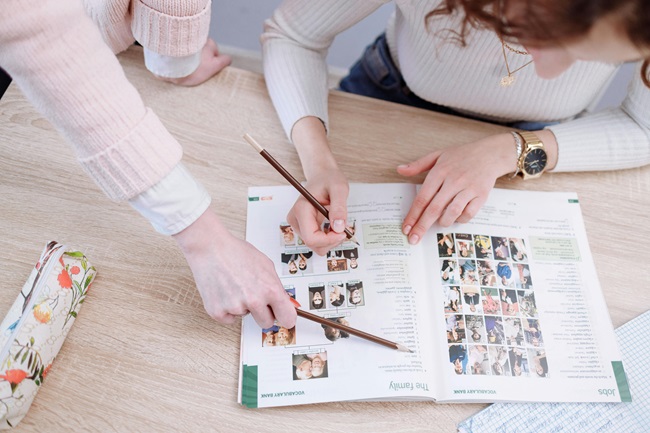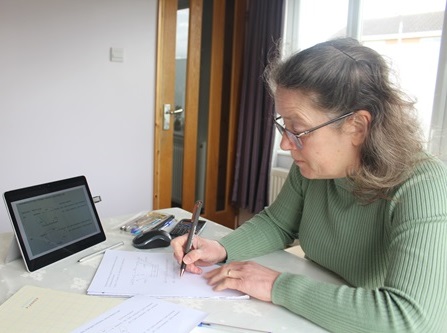Written by: Monique Oude Luttikhuis
Published: 17-04-2024

In addition to being a language professional, I also tutor students aged 14‒18 in biology, chemistry and maths. To understand what is involved, a short introduction of how the UK education system is organized may be useful.
Education for 11- to 18-year-olds in the UK
Within the UK, the education system is different for the four different nations. In England, children are in compulsory full-time education between the ages of 5 and 16, covering primary and secondary education. At the end of secondary education, students are expected to sit their General Certificate of Secondary Education (GCSE) exams in seven to ten subjects, which are graded from 9 (top grade) to 1. Anyone who has not received a grade 4 or higher for English and maths must sit the exams again. Options after the age of 16 include doing an apprenticeship and studying for vocational, technical or academic qualifications. Gaining academic qualifications requires minimum GCSE grades and an additional two years of study at ‘sixth form’ to study three Advanced Level qualifications (commonly referred to as ‘A-levels’). A-levels are graded from A* (top grade) to E (lowest pass grade). To go to university, students require A-levels or another equivalent qualification.
Universities make students an offer, which means that if they get grades A*, A or B for their three A-level subjects, for example, they can come to that university to study the course they applied for. So, the pressure is on throughout students’ time at school. In the UK, 27% of 11- to 16-year-olds say they have received private tuition at some time (Sutton Trust, Private Tuition Polling 2019). The most common reasons given for engaging a private tutor are help with general schoolwork and passing one or more exams.
Students in the UK hardly ever repeat a school year; students who start school at the same time move through the education system at the same rate, regardless of ability. Secondary education varies across regions of England, where some regions have ‘grammar schools’ in addition to ‘comprehensive schools’. Comprehensive schools do not select their intake on the basis of academic achievement or aptitude. To attend a grammar school, students must pass a test that covers verbal and non-verbal reasoning and sometimes also English and maths. This means that the pressure to perform well starts even earlier, at age 10, and because of the need to pass, many people are looking to private tutors.
 Challenges
Challenges
The county where I live (Lincolnshire) has grammar schools. Expectations are high, both by the school and by the parents. Some students come to me fairly early on (a year or two before their GCSE exams) if they are not progressing satisfactorily. In that case, it is up to the tutor to find out why, which is not as easy as it sounds if you only tutor them for one hour a week. Ideally, you’d like the student to point out what area of the curriculum they struggle with most, but they often don’t know themselves. In that case, you start with the basics – identify any gaps in their knowledge and correct misconceptions.
Other students come to me a few months before their exam when they are worried about obtaining the result required by their chosen university. In that case, reducing anxiety and stress becomes a major goal. Again, you’d like the student to tell you if there are any specific topics that we need to work on. If there is nothing specific, practising past exam papers is a good strategy to identify areas to focus on.
Since all students have different needs and learning styles, the approach to tutoring varies and every lesson will be prepared for that one student (I have up to 15 students at any one time). It is important to all students that I create an atmosphere in which they feel comfortable to ask questions they may be afraid to ask in a classroom setting. It is only when there is a good interaction between tutor and tutee that the tutoring sessions are most efficient and that most progress is made.
A further challenge for tutors in the UK is that there are as many as four examination boards with up to six different specifications per subject. Schools are free to choose whichever examination board and specification they wish to use, so a tutor can have, for example, six biology students who will each take a different exam. Tutors then must familiarize themselves with the various examination boards and acquire specific teaching materials.
Rewards
Tutoring can be rewarding. It is a means of supplementing classroom teaching in a quiet space. This is very helpful for students who are struggling to keep up with work in a noisy environment. These students often thrive in one-to-one tutoring sessions where they receive personal attention. I very much enjoy seeing their confidence grow, which generally results in improved grades.
Another rewarding aspect is finding out that your support has helped students to reach their goals, gaining entry to a course at the local college or at a university. It is rewarding to know that you helped them reach the next stage of their learning journey.
I am very interested in medicine, biology, chemistry and maths, and tutoring is a way of engaging with it most days. I try to share any new information with my students. A-level students in particular appreciate this since they often wish to study medicine or a branch of biology or chemistry at university.
Tutoring, translating and editing
The combination of tutoring and translating/editing suits me. I am a qualified teacher and as such enjoy interacting with students and knowing that I can make a difference. However, 15 contact hours a week is enough since all tutoring sessions occur late in the day after school has finished. The language work also allows me to be involved in medicine and life sciences but in a different way. I love working away quietly at long interesting projects. For me, the different roles complement each other well.
|
Blog post by: Monique Oude Luttikhuis Website: tuitionandtranslationservicesspalding.com LinkedIn: monique-oude-luttikhuis |


